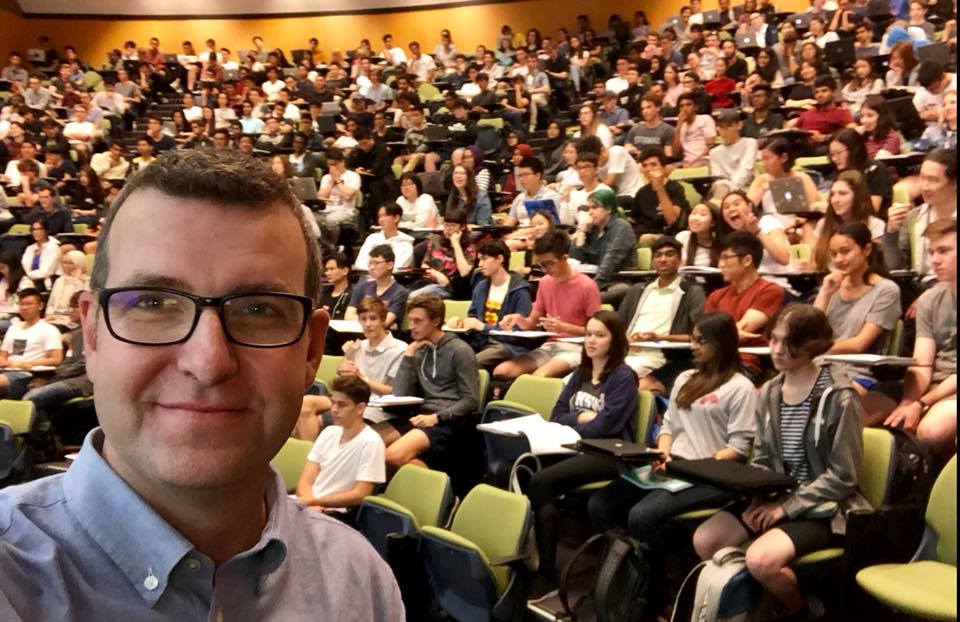Transcript auto-generated by YouTube.
Hello! Chris Tisdell here. In this video I’m going to reflect on my week’s readings about Lev Vygotsky. So I’m drawing on a chapter from a book. The author of the chapter is Margaret Walshaw and the book is “Alternative theoretical frameworks for mathematics education research” by de Freitas et al.
So what I’ll do in this video is just briefly talk a little bit about Vygotsky and his theory. But more importantly I’m going to raise some questions regarding the readings.
So, Vygotsky’s fundamental position or assumption for his theory is that all learning is social. And it takes place through cultural and psychological tools. Essentially people have interactions with other people they’re influenced by by cultural norms. For example, people argue, people will mediate, and through the process learning takes place.
So when I was reading this article a few questions came to mind. And so let me go through those questions quickly.
One of the elements of this chapter was about Vygotsky’s idea of internalization. So,
for example, a child may want to learn a topic. They bring, they internalize it, so it’s essentially they have some understanding of how to to do it, whether it’s a process or or some concept and through that they also kind of remix the the idea or the concept to be meaningful to them. And all those thoughts are, of course, influenced by by society and other interactions.
So when I was thinking about that that internalization that that knowing how to use certain cultural tools or do certain things, I was thinking where is the boundary between sort of the internal and the external and how do people actually demonstrate this internalization? How do you demonstrate that you you know how to do things?
And, you know, when I was thinking about that. I’m thinking – isn’t that exactly what I’m trying to do with Vygotsky’s theory? This is something that you could argue is is external to me. I’m trying to internalize Vygotsky’s theory, know how to use it, know how to apply it.
And I’m also mindful in the process that I’m going to be bringing all my beliefs into
the process. So how will that remix or transform that work of Vygotsky through my eyes? Well, time will tell.
The second question was throughout the chapter, Vygotsky and Walshaw, and indeed, even the case study at the end. they’re all involved with children. So, you know, a child is learning something. The algebra discussion near the end of the chapter was set in perhaps a Year 8 setting. So, for me, I’m looking around my environment and my circumstances and trying to work out the the child in the university context. I don’t teach children, I teach adults. How is that different, if at all, from from the discussion in Chapter Two?
Vygotsky and Walshal also talked about scaffolding. So when I was reading that I was pleased to see a place for pedagogy and a place for teachers. I know that recently, at least in the higher education context, people are talking about, you know, getting rid of teachers and there’s no place for teachers.
They’ve moved from the, you know, the sage on the stage to the guide on the side, you know, your friend at the butt-end perhaps. The status of teachers is is diminishing, and I’m thinking of writers like Biesta and learnerfication. So I was very pleased to see Vygotsky and Walshaw taking a strong stance on the the need for for teachers and the need for teaching through the scaffolding process. It’s pleasing to see that.
I think that I don’t think I have anything more to say.
My questions:
- the barrier between the internal and the external
- I’m conscious that I’m trying to internalize a theory about internalization
- the child within the university context – who is that? What makes them special or different?
- the place for pedagogy through scaffolding and the place of the teacher – great!
Lastly, when I look around, (I gave a lecture today) so I was thinking – how am I making learning social within this framework? So, we’re talking about three hundred and eighty or so students. One experiment that I’m trying at the moment is some quizzes on a mobile phone where I “stop” the class and the students get to talk to each other. And, you know, they’ll fill in some online quiz by chatting to their neighbors or whatever.

It’s quite hard to do at scale in in a lecture theatre but I’m going to continue that and see if I can ground what I’m doing within the theory of Vygotsky.
Anyway thanks for watching. Any feedback you have will be warmly welcomed.